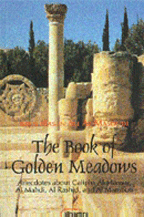|
The Book of Golden meadows
Abul Hasan Ali Al-Masoudi
|
||||
|
The Caliphate of Al Mansur, The Builder of Bagdad Al Mansur, the third Caliph of the house of Abbas, succeeded his brother Es-Saffah (“the blood-shedder”). a.d. 754. He was a prince of great prudence, integrity, and discretion; but these good qualities were sullied by his extraordinary covetousness and occasional cruelty. He patronized poets and learned men, and was endowed with a remarkable memory. It is said that he could remember a poem after having only once heard it. He also had a slave who could commit to memory anything that he had heard twice, and a slave-girl who could do the same with what she had heard three times. One day there came to him a poet bringing a congratulatory ode, and Al Mansur said to him: “If it appears that anybody knows it by heart, or that any one composed it — that is to say, that it was brought here by some other person before thee — we will give thee no recompense for it; but if no one knows it, we will give thee the weight in money of that upon which it is written.” So the poet repeated his poem, and the Caliph at once committed it to memory, although it contained a thousand lines. Then he said to the poet: “Listen to it from me,” and he recited it perfectly. Then he added: “And this slave, too, knows it by heart.” This was the case, as he had heard it twice, once from the poet and once from the Caliph. Then the Caliph said: “And this slave-girl, who is concealed by the curtain, she also recollects it.” So she repeated every letter of it, and the poet went away unrewarded. Another poet, El Asmaïy, was among the intimate friends and table-companions of the Caliph. He composed some very difficult verses, and scratched them upon a fragment of a marble pillar, which he wrapped in a cloak and placed on the back of a camel. Then he disguised himself like a foreign Arab, and fastened on a face-cloth, so that nothing was visible but his eyes, and came to the Caliph and said: “Verily I have lauded the Commander of the Faithful in a ‘Kasidah’” (ode). Then said Al Mansur: “O brother of the Arabs! if the poem has been brought by any one beside thee, we will give thee no recompense for it; otherwise we will bestow on thee the weight in money of that upon which it is written.” So El Asmaïy recited the Kasidah, which, as it was extraordinarily intricate and difficult, the Caliph could not commit to memory. He looked toward the slave and the girl, but they had, neither of them, learned it. So he cried: “O brother of the Arabs! bring hither that whereon it is written, that we may give thee its weight.” Then said the seeming Arab: “O my Lord! of a truth I could find no paper to write it upon; but I had amongst the things left me at my father’s death a piece of a marble column which had been thrown aside as useless, so I scratched the Kasidah upon that.” Then the Caliph had no help for it but to give him its weight in gold, and this nearly exhausted his treasury. The poet took it and departed.
|

